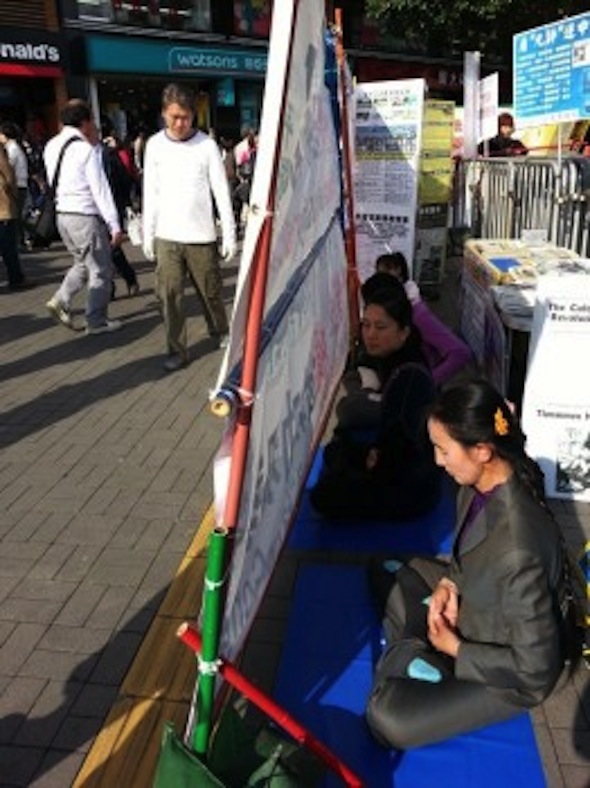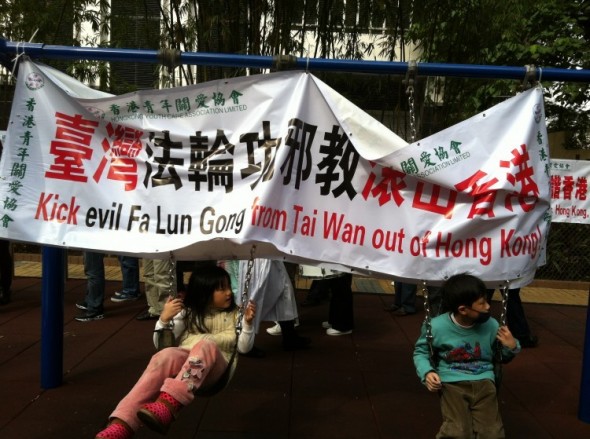Communist Front Group Seeks to Silence Hong Kong Falun Gong
The Epoch Times
By Stephen Gregory
Epoch Times Staff

Hong Kong is a city proud of its legacy of individual rights, but a campaign to deny those rights to Falun Gong practitioners has proceeded systematically and in the open for eight months, while the city’s police stand aside. Hong Kongers are by turns annoyed and alarmed as the character of their city seems to be changing before their eyes.
On the morning of June 10, 2012 Falun Gong practitioners arrived at the Hung Hom train station in Hong Kong as they had every day for the past ten years. They planned on setting up information booths where they would tell people about their spiritual practice and how it is persecuted in China. This day was different, though.
In the spots they would ordinarily occupy, individuals wearing uniform shirts had hung banners that attacked Falun Gong. When the practitioners hung their own banners in other spots, that group hung banners covering the Falun Gong banners. The new group also began blasting communist propaganda through a sound system.
When the practitioners approached police officers, as they had in the past if there were problems at this site, the police refused to get involved.
This group that first popped up at Hung Hom is called the Hong Kong Youth Care Association and since June 10 it has had Falun Gong in Hong Kong firmly in its sights.
The Association’s very simple website claims it is devoted to various charitable enterprises such as helping the poor and contributing to the community.
In fact, the Association appears to be a front organization for a deadly Party organ. A front organization has no public ties to the Chinese Communist Party, but works to isolate and attack the Party’s enemies.
A reporter for Hong Kong’s Next magazine traveled to the office the Association maintains in Shenzhen, just across the border from Hong Kong in mainland China, and uncovered the Association’s close ties to the CCP.
The Association’s Shenzhen office stands next door to the local 610 Office. The 610 Office—its name comes from the date of its founding, June 10, 1999—is a Party organization tasked by then Communist Party head Jiang Zemin with eradicating Falun Gong.
The Next reporter tried the door for the Hong Kong Youth Care Association, but it wouldn’t open. A staff member from the 610 Office came out to help. “The two associations have the same people,” the staff member said, according to the Next Magazine report.“Two door signs. If you want to find them, come here. That side won’t open.”

The Youth Care Association is headed by Lin Guo-an a member or former member of the pro-communist political party Democratic Alliance for the Betterment and Progress of Hong Kong (DAB) and currently Special Councilor in of the People’s Political Consultative Conference of Jinggangshan City in southeastern China’s Jiangxi Province, according to Next Magazine.
The journalist Ching Cheong told Radio Television Hong Kong that if the Hong Kong Youth Care Association is a front group, then “the mainland public security people are implementing their laws in Hong Kong.”
Tourists and Tuidang
In 2011, the last year for which numbers are available from the Hong Kong Tourism Commission, Hong Kong hosted 28.1 million tourists from mainland China. Falun Gong practitioners have set up booths at popular tourist sites throughout Hong Kong to reach these tourists.
The booths typically have a table surrounded by banners and placards. The practitioners hand out fliers and may demonstrate Falun Gong’s slow-motion exercises.
The practitioners want to disabuse the mainland tourists of the anti-Falun Gong propaganda they have been steeped in, so they tell them about the practice, and about the cruelties of the persecution against it. And they ask the tourists to renounce any association with the Communist Party—an act called “tuidang” in Chinese.
“The Chinese Communist Party really fears tuidang,” said Juliana Chan, a Falun Gong practitioner and a retired travel agency executive. According to the Global Service Center for Quitting the CCP, over 133 million Chinese have renounced the Party.
“The Youth Care Association seeks to mislead the tourists,” Chan said. “The tourists arrive and they can’t get close to our booths and they see communist propaganda instead.”
Blind Spot
On Chinese New Year’s Day, Feb. 10, the police ordered the Youth Care Association and the Falun Gong practitioners each to remove all of their banners from Star Ferry—one of the busiest spots in Hong Kong and a prime tourist attraction.
The next day, Wincy Chan, who regularly helps staff the information site at Star Ferry, said that an army of Association members covered the entire Star Ferry with its banners, including the spot customarily maintained for years by the practitioners. On Feb. 13 the police assigned a spot to the Falun Gong practitioners against a wall so that they would have a place to set up their booth.
The Association then set up a rack with its banners that formed a wall between the practitioners and the public. The Association’s rack was so close to a lane on the sidewalk reserved for the use of the blind that the lane was in effect impassable.
Practitioners called the police, and a video shows what happened next. The Associations’ head, Lin Guo-An, showed no deference to the police, who requested that the banners be moved. He argued heatedly with them, and in the end the police withdrew, leaving the Association’s banners in place.
Falun Gong practitioners tell of the Association trying on a daily basis to completely cover their information booths with banners.
Mandy Liu, an old hand at the information sites, says the police could easily resolve any conflicts between the two groups.
“If the police assigned one spot to the Hong Kong Youth Care Association and another spot to the Falun Gong practitioners, and then enforced their decision, there would be no problems,” Ms. Liu said.
No Ground Rules
Without the police setting ground rules, there is room for even more mischief.
Mandy Liu says the practitioners who staff the information sites are suffering a reenactment of the Cultural Revolution. Videos show the Association members shouting at practitioners, cursing them, waving fingers in their faces, and pushing them.
Practitioners began videoing all confrontations with the Association members after an incident at the Lok Ma Chau border crossing with mainland China.
“The Hong Kong Youth Care Association members have these huge banners,” Ms. Liu explained. “They wrapped our practitioners inside these banners and beat them. No one could see what was happening behind the banners. By the time the police arrived, there was no evidence. So, we began videoing everything.”
Zeng Qiaochan is a practitioner who helps staff the Lok Ma Chau information site. She says physical abuse continues there.
“Their banners have long sticks at each end,” Zeng said. “When no one is looking they whip those sticks down and hit your hands or feet. They do it so quickly, you can’t catch them on video.”
On July 4 at the Hung Hum train station, a member of the Association brandished a large knife in front of a New Tang Dynasty TV reporter who was filming the Association’s activities. Police were called, but were not interested in seeing video of the incident and chose to do nothing.
Wincy Chan said the harassment by the Association has an ulterior motive.
“These people try to create a situation where practitioners will involuntarily defend themselves—a situation where they can accuse the practitioners of breaking the law or beating them up,” Chan said. “Because we cultivate truthfulness, compassion, and tolerance we avoid having any kind of conflict with them.”
Legalities
The police have told practitioners that there is no legal basis for stopping the Association from putting up its banners. According to Mandy Liu, the police have said, “both sides have the right to speak, if there is no conflict this situation has nothing to do with us.” Recently the police told practitioners they are “gathering evidence.”
A request for comment from the Service Information Office of the Police Public Relations Bureau in Hong Kong had not been answered at press time.
Some of Hong Kong’s netizens say the police refuse to defend the practitioners because of the Association’s CCP connections.
The practitioners say they should be protected under the Hong Kong Basic Law, whose Public Order Ordinance states in part, “Any person who at any public gathering acts in a disorderly manner for the purpose of preventing the transaction of the business for which the public gathering was called together or incites others so to act shall be guilty of an offence.”
Hong Kong is also a signatory of the International Covenant on Civil and Political Rights, which states that “any advocacy of national, racial or religious hatred that constitutes incitement to discrimination, hostility or violence shall be prohibited by law.”
With the police refusing to protect them, the Hong Kong practitioners are investigating gaining redress through the courts.
The Hong Kong Youth Care Association could not be reached for comment by press time.
Public Opinion
In November 2012, the Association’s campaign spread from the information sites to Hong Kong’s streets. Hundreds, if not thousands, of its banners now line Hong Kong’s busiest and most chic thoroughfares.
Social media and blogs in Hong Kong are filled with complaints: The banners have destroyed Hong Kong’s cityscape; they’re a traffic hazard; they disrupt city life; and they’re an embarrassment.
In December, stickers started appearing on the banners saying, “Not From HK People.” An organization called Hong Kong Citizens Attending to the Falun Gong Issue was formed.
When someone destroyed a number of the Association’s banners, netizens cheered. A message posted to Mini forum.net, Hong Kong bulletin board, said: “The government is offering shelter to the communist thugs, and the citizens are acting on behalf of heaven. From Mon Kok to Nathan Road, some banners and nearly 70 posters destroyed.”
Several members of Hong Kong’s Legislative Council have called on the police to protect the rights of Falun Gong practitioners, but the sympathetic Legco members are powerless to help. They are the minority in a body dominated by CCP allies.
Chow Wai Tung, the district councilor of the Democratic Party in Hong Kong, told The Epoch Times for a previous report, “The CCP thinks that Jiang Zemin and his like can just do whatever they please in Hong Kong, and this Youth Care Association was established just at this time, and right after it’s set up it goes and specifically targets Falun Gong and does all these wicked and shady things.”
“Falun Gong is the conscience of Hong Kong, a kind of moral compass of Hong Kong; it’s the most law abiding, kindest group of people,” Chow said. “If even they are attacked, then no group, and no individual in Hong Kong is safe.”
Reporting by Zhou Meihua.
The Epoch Times publishes in 35 countries and in 21 languages. Subscribe to our e-newsletter.
